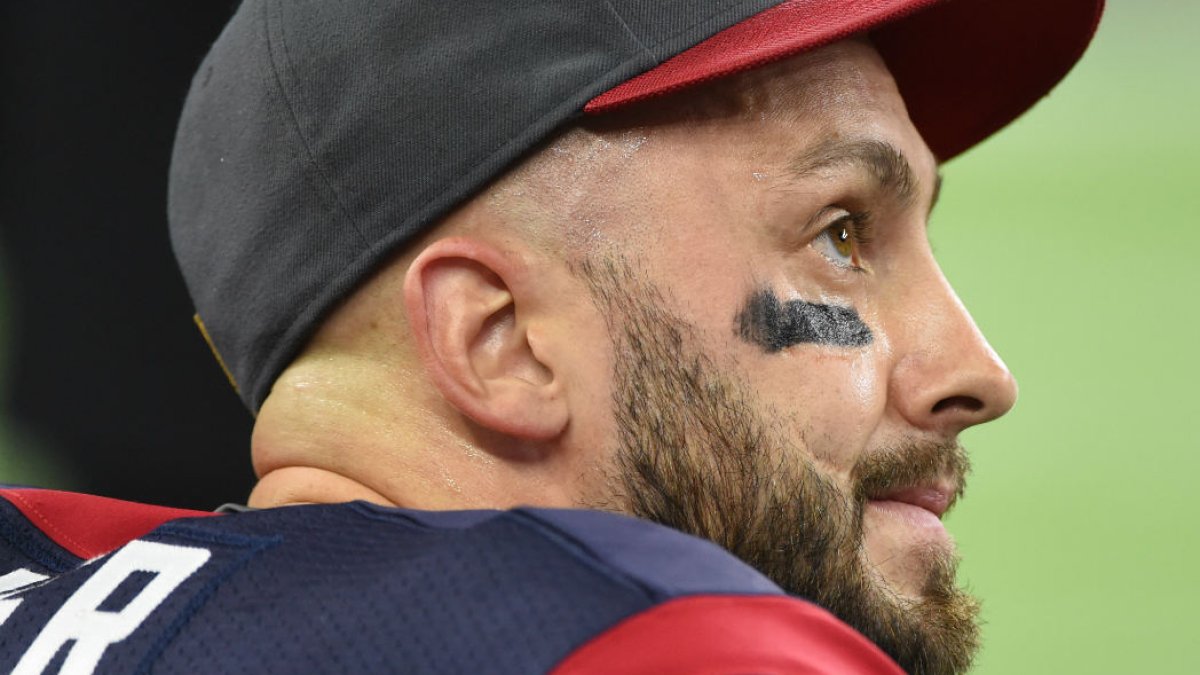In the first Wild Card game of the weekend, what looked like a pretty close matchup on paper was quickly transformed into a 30-0 blowout thanks largely to the work of one man: Houston Texans quarterback Brian Hoyer.
Hoyer’s grade of -8.3 stands as the worst quarterback performance we have ever seen in postseason play, and the fact he remained in the game for the duration of it is remarkable.
You can certainly understand the reluctance to pin all of your hopes for the season on Brandon Weeden mounting a comeback, but at some point it was objectively clear that Hoyer needed to be taken out of the game.
In the second half, Houston essentially began to run the “Brandon Weeden offense,” with shorter, easy-to-execute passes, and Hoyer couldn’t even hit those accurately. At that point he should have been removed from the game, even if it was probably too late to have any positive effect on the outcome.
For the game, Hoyer’s passer rating was just 15.9, which when you consider just throwing the ball into the turf every play gives you a passer rating of 39.6, shows you how truly self-destructive he was with the football. He threw four interceptions, and these weren’t the kind where you can point to miscommunication, bad bounces, unlucky plays or any other mitigating circumstances. Hoyer was making poor decisions and compounding those bad decisions with poor accuracy on the plays where he was reading things right.
Most quarterbacks struggle the most when pressured — and Hoyer’s passer rating when he felt heat in this game was 30.8, which is pretty terrible — but the real problem was what he was doing from a clean pocket.
When he had time to deliver the ball in rhythm without any pressure his passer rating was 9.7, and three of his four picks came on these plays. He only completed 37.5 percent of his passes when he faced no pressure at all, in a league where 70 percent is becoming the new target for quarterbacks to shoot for.
Of Hoyer’s 15 completions in the game, 11 of them were on passes thrown under 10 yards in the air.
The real issue for the Texans is that they have had no quarterback all season, or last season, or for some time. They have one of the league’s best receivers in DeAndre Hopkins and he is being wasted by a revolving door of inadequate quarterbacks. The same can be said for J.J. Watt and the Houston defense which is now rounding into more of an all-around dominant unit than just a one-man band.
The Texans made the playoffs this season (albeit from a poor division) with Brian Hoyer, Ryan Mallett, T.J. Yates and Brandon Weeden earning playing time for them. It says a lot about the standard of that play that Weeden was probably the standout of the group, and his previous baseline is so bad that the Texans refused to put him in this game even when Hoyer did all that he could to get benched.
Bill O’Brien claimed on Hard Knocks this preseason that he was tired of hearing people bash Houston’s quarterbacks, and that the group could play well if given the opportunity. They got that opportunity this season, and Hoyer in particular was given more than enough opportunities, only to play his worst when the Texans needed him the most. That now marks consecutive seasons in which Hoyer has played well for brief stretches, only to implode in spectacular fashion late on in the year.
The Texans are in desperate need of a quarterback upgrade over the offseason, and there was no greater evidence of that than the situation they found themselves in against Kansas City: a starter playing so poorly he demanded to be benched, and a backup so bad the team didn’t believe he would be an upgrade.


 © 2024 PFF - all rights reserved.
© 2024 PFF - all rights reserved.